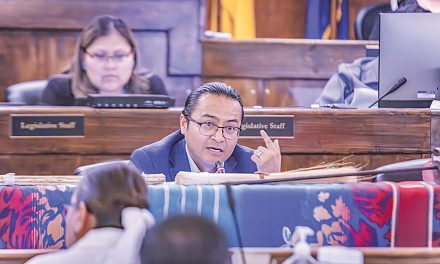
50 Years Ago: Navajo Police walk off, demand better pay
Sick of the low pay and being required to work 20 to 30 hours of overtime, members of the Navajo Police did what they threatened to do – walk off their jobs as a protest to conditions they had to face daily as tribal police officers.
Police representatives had threatened to stage a walkout for weeks but none in the tribal government expected them actually to do it.
But on Sept. 2, according to tribal police leaders, 80% of patrol offices either resigned or were absent without leave beginning at 9 a.m. as a show of force, saying they wanted the government to immediately address their demands or watch the walkout continue indefinitely.
Navajo Tribal Chairman Peter MacDonald said the tribe has agreed to set up a committee to discuss their 17 demands. At the same time, he gave them his personal guarantee that the tribe was finally listening to their concerns and would make significant changes in the near future.
The superintendent of the tribal police department, Lafia Bennett, also made a personal appeal to officers to come back to work and, by 6 p.m., promising that if they came back he would support them and even write a resolution to go before the Navajo Tribal Council at their next meeting.
Most of the police force was back at work by 6 p.m. with reports by the Navajo Times that few of them believed that Bennett and MacDonald would carry out their promises.
Bennett said for the Council to agree to a pay increase – the officers are asking for a 25% increase to bring their salaries up to the average paid by other police departments in the area – it would have to change the tribe’s current laws dealing with giving out overtime pay.
Tribal policy prohibits giving overtime pay to any tribal employee making more than $6,000 a year. The beginning salary for a police patrolman is $6,149 a year.
To get around this, most tribal departments allow employees who work overtime to take future time off to make up for it.
Bennett said that would not work in his department because they were so short of staff that they could not afford to allow anyone compensatory time.
Bennett said that as soon as officers within the department were made aware of the walkout, they called county and state police departments and each of those departments provided units to address calls for aid that seemed to be the most important.
“No one on the reservation suffered because of the walkout,” he said.
Some in the tribal government wanted to take action against the leaders of the walkout and a committee was set up to deal with disciplinary action against them. Eventually, cooler heads prevailed and there was a change in the atmosphere as most leaders understood the officers’ feelings. But they wanted to make sure there would be no future walkouts.
The big question that remains unanswered is whether there would be any future walkouts and if so, what the tribal leadership could do to protect reservation residents if it should happen again.
“The officers accomplished what they set out to do – make reservation residents realize the importance of the work done by the tribal police and to give officers a fair wage so I don’t think another walkout will accomplish anything,” Bennett said.
Those involved in the walkout would not be punished but anyone who violates tribal policy in the future by holding a walk would or a sick out would face disciplinary action.
Uptick in car thefts
Speaking of the tribal police, there was a report that the reservation was seeing a major uptick in car thefts in the past few months.
Actually, thefts of pickups would be a better term since most of the vehicles that had been stolen were pickups and the department put out a press release urging people to be more careful about locking their vehicles.
Up until recently, car thefts on the reservation were very rare in part because there were only a few roads leading off the reservation. If someone reported their vehicles stolen. Police would send patrol cars to monitor traffic on the roads leading to off-reservation communities.
It was usual to see only a few car thefts occur annually with many car thieves being arrested before they managed to get the vehicle off the reservation.
But this has changed in the last couple of months when the department began receiving reports of two or three cars being stolen every month. Most of them are being taken from the major communities on the reservation. But other reports said some thefts were in small communities like Dilkon and Low Mountain.
The police department press release asked residents to make sure their vehicles were locked when no one was in them, especially when they were grocery shopping.
Bennett pointed out that reservation residents have a special dependency with their vehicles and the loss of it would have a devastating effect on their lifestyle.
He also pointed out that, looking at the police reports, many of those who had cars stolen had no insurance.








 Highway 264,
Highway 264, I-40, WB @ Winslow
I-40, WB @ Winslow